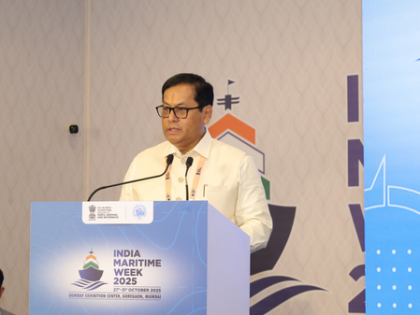India aims 70 pc carbon emission cut per tonne of cargo by 2047: Sarbananda Sonowal
By IANS | Updated: October 28, 2025 20:55 IST2025-10-28T20:52:16+5:302025-10-28T20:55:08+5:30
Mumbai, Oct 28 India’s maritime sector forms the backbone of its economy, with over 95 per cent of ...

India aims 70 pc carbon emission cut per tonne of cargo by 2047: Sarbananda Sonowal
Mumbai, Oct 28 India’s maritime sector forms the backbone of its economy, with over 95 per cent of the nation’s trade by volume moving through the sea, Union Minister Sarbananda Sonowal said on Tuesday, adding that under the Net Zero by 2070 commitment, India aims to reduce carbon emissions per tonne of cargo by 30 per cent by 2030 and 70 per cent by 2047, making the sector a key driver of climate action.
Addressing the ‘India Maritime Week (IMW) 2025’ here, Sonowal highlighted India’s unwavering focus on building a sustainable and resilient maritime future.
“At ‘Green Maritime Day’, it is a day that embodies our shared resolve to shape a cleaner and more sustainable future for global shipping,” the minister told the gathering.
Sonowal emphasised that flagship initiatives such as the Sagarmala Programme, Maritime India Vision 2030, Harit Sagar Guidelines, and the Maritime Amrit Kaal Vision 2047 place sustainability, innovation, and climate responsibility at the core of India’s maritime growth.
Through the National Green Hydrogen Mission, India has designated VOC, Paradip, and Deendayal Ports as green hydrogen hubs, laying the foundation for a clean-fuel economy.
Across the country, over 12 million metric tonnes of green hydrogen-based e-fuel capacity has been announced, with ports emerging as centres for production, bunkering, and exports, driving industrial growth and green jobs.
“As we look toward Amrit Kaal 2047, our goal is not only to expand maritime capacity but also to make it greener, smarter, and more resilient,” Sonowal said.
“With our unique geography along key global trade routes, India is poised to become a hub for green shipping corridors, connecting domestic and international markets through clean energy trade,” he added.
Five major reports were released during the session, focusing on green hydrogen, e-fuels, zero-emission trucking, pollution control, and green port performance benchmarks.
“With our unique geography along key global trade routes, India is well placed to become a hub for green shipping corridors, connecting domestic and international markets through clean energy trade. To harness this opportunity, India has launched Green and Digital Shipping Corridors (GDSCs) with Singapore and the Netherlands. These partnerships will help scale investments and strengthen India’s position as a bridge between global trade and sustainable growth,” the minister highlighted.
Disclaimer: This post has been auto-published from an agency feed without any modifications to the text and has not been reviewed by an editor
Open in app